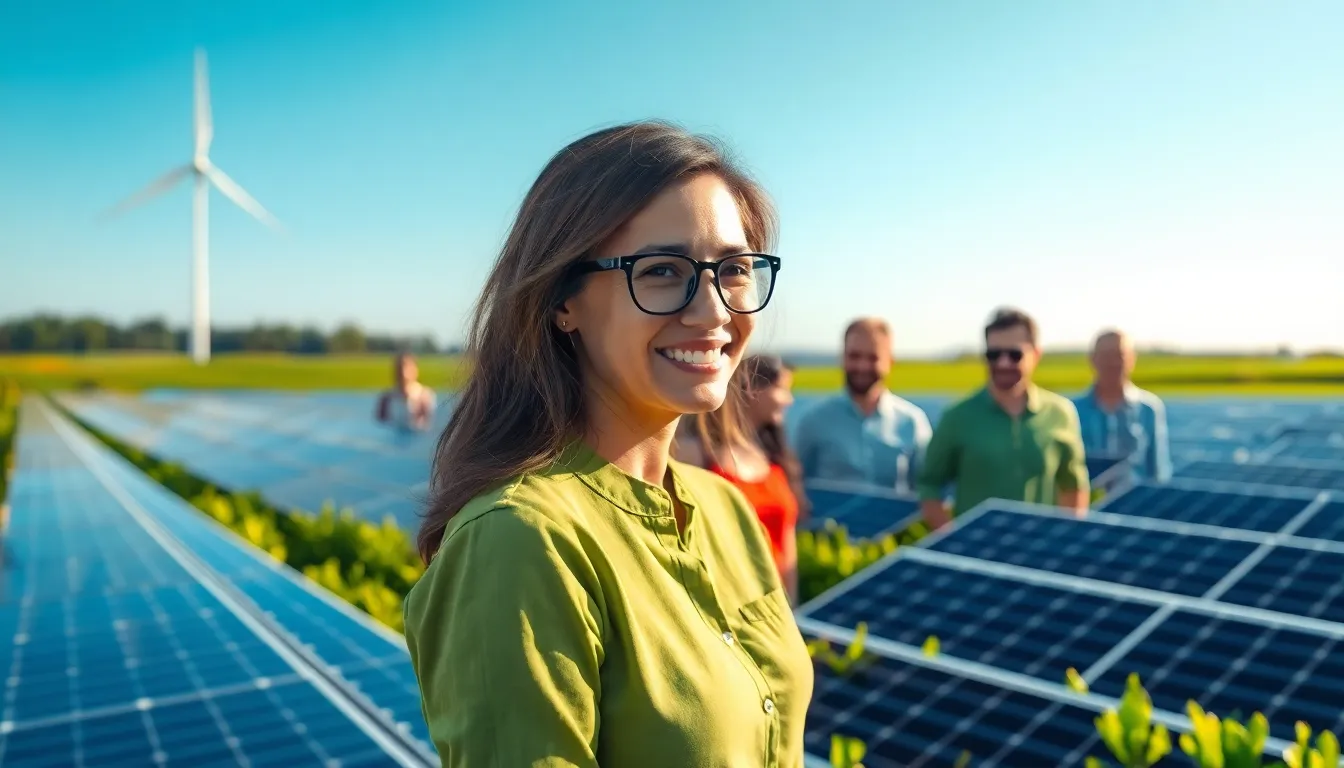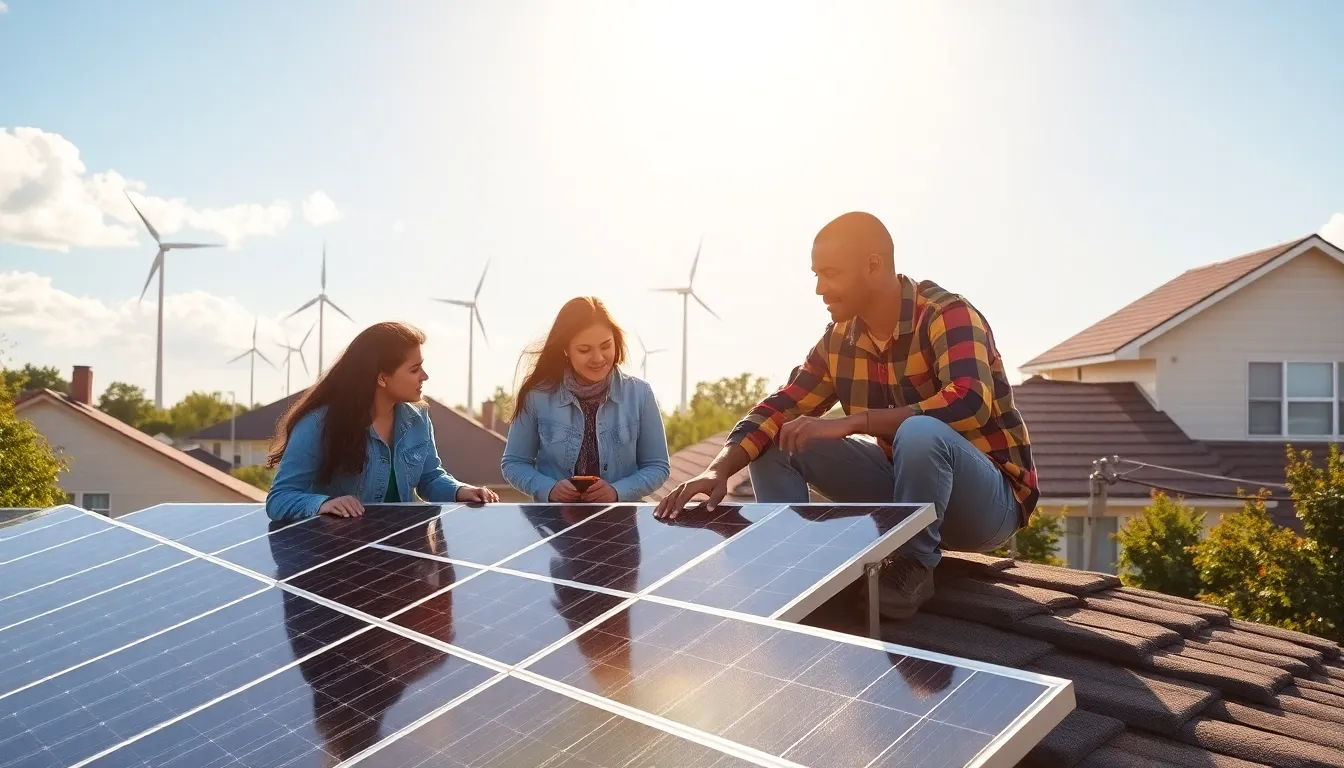In a world where the latest tech trends often feel more like a race to the bottom, new sustainable technology is here to save the day—and the planet. Imagine a future where gadgets don’t just make life easier but also help reduce carbon footprints. It’s like having your cake and eating it too, but this cake is made from recycled materials and powered by renewable energy!
From solar-powered smart homes to biodegradable phone cases, these innovations are changing the game. They’re not just for tree-huggers anymore; they’re for everyone who wants to be part of a greener future. So buckle up as we explore the exciting realm of sustainable technology that’s not only smart but also a little quirky. Who knew saving the Earth could be this much fun?
Table of Contents
ToggleOverview Of New Sustainable Technology
Sustainable technology emerges as a crucial solution to pressing environmental challenges. Innovations in this field focus on enhancing everyday convenience while significantly reducing carbon footprints. Solar-powered smart homes represent a prime example of how technology can provide both efficiency and sustainability. These residences utilize solar energy, allowing individuals to lower their energy bills while contributing to renewable energy usage.
Biodegradable phone cases show another facet of sustainable technology. Made from plant-based materials, these cases break down naturally after disposal, minimizing plastic waste in landfills. Consumers today increasingly demand eco-friendly alternatives, and manufacturers respond with products that reflect this growing trend.
Electric vehicles continue to transform the transportation sector. They produce zero emissions during operation and help reduce reliance on fossil fuels. Additionally, advancements in battery technology improve the range and efficiency of these vehicles, making them a more viable option for everyday use.
Smart home technology integrates various sustainable practices into daily routines. Devices such as smart thermostats optimize energy use by adjusting heating and cooling based on occupancy patterns. Homeowners enjoy energy savings while simultaneously minimizing their environmental impact.
Investments in wind energy represent an essential development in sustainable technology. Wind farms harness natural wind flows to produce renewable electricity, offering a clean alternative to traditional power sources. This approach reduces greenhouse gas emissions and promotes a more sustainable energy grid.
Overall, sustainable technology presents diverse options for individuals to engage with environmentally friendly practices. These innovations invite everyone to participate in creating a greener future while enjoying the benefits of modern convenience.
Importance Of Sustainable Technology

Sustainable technology plays a crucial role in addressing environmental challenges while promoting economic growth. This intersection encourages innovation that aligns with ecological preservation.
Environmental Impact
Sustainable technology significantly reduces harmful emissions associated with traditional practices. Electric vehicles contribute to this by producing zero emissions, thereby enhancing air quality. Solar-powered solutions further lower carbon footprints by utilizing renewable energy sources. Innovations like biodegradable materials minimize plastic waste while preserving natural resources. Adoption of wind energy captures natural forces to generate electricity, effectively decreasing greenhouse gas emissions. Collectively, these advancements create a healthier environment, which benefits both ecosystems and communities.
Economic Benefits
Sustainable technology fosters economic growth through job creation across various sectors. The renewable energy sector is rapidly expanding, generating employment opportunities in solar, wind, and electric vehicle industries. Cost savings emerge as energy-efficient technologies lead to lower utility bills. Long-term investments in sustainable solutions often yield significant financial returns. Additionally, consumers increasingly prefer eco-friendly products, which drives market demand and stimulates local economies. Embracing sustainable practices also enhances brand reputation, attracting environmentally conscious customers and fostering loyalty.
Types Of New Sustainable Technology
Sustainable technology encompasses various innovations designed to promote environmental health. The following categories highlight the most impactful advancements in this field.
Renewable Energy Solutions
Solar panels and wind turbines represent key renewable energy solutions. These technologies harness natural resources to generate clean electricity. Solar energy systems lower energy costs while decreasing reliance on fossil fuels. Wind turbines convert the kinetic energy from wind into power, contributing to a significant reduction in greenhouse gas emissions. Hydro energy systems also play a crucial role, utilizing flowing water to produce renewable electricity. Collectively, these solutions support a cleaner energy grid and foster energy independence.
Eco-friendly Materials
Eco-friendly materials significantly impact sustainability efforts. Biodegradable options, like plant-based plastics, reduce environmental pollution. These materials decompose naturally, minimizing waste in landfills. Recycled materials, such as reclaimed wood or metal, extend the lifecycle of products while conserving resources. Innovations also include sustainable textiles made from organic fibers, offering environmentally responsible alternatives to traditional fabrics. Each of these materials contributes to a circular economy by reducing resource extraction and enhancing product sustainability.
Innovations In New Sustainable Technology
The landscape of sustainable technology continues to evolve rapidly, showcasing various innovations that address environmental issues. Several remarkable advancements indicate a strong trend towards a greener future.
Breakthrough Research
Research efforts in sustainable technology yield groundbreaking results. Scientists develop innovative materials that capture carbon dioxide, potentially reducing greenhouse gases in the atmosphere. Advanced solar technologies now include transparent solar cells, enabling windows to generate electricity. In biotechnology, researchers create biodegradable alternatives to conventional plastics, addressing pollution issues directly. Studies also demonstrate the effectiveness of energy storage systems, promoting renewable energy consumption by stabilizing supply.
Emerging Startups
Numerous startups are entering the sustainable technology realm, driving significant change. Companies focusing on vertical farming techniques efficiently use space and resources to produce food sustainably. Innovations in water purification technologies provide clean drinking water in resource-limited areas. Data-driven platforms help consumers make eco-friendlier choices by highlighting sustainable products, while subscription services for electric vehicles encourage greener transportation options. Startups introducing renewable energy solutions like community solar programs enhance energy accessibility, allowing neighborhoods to share benefits.
Future Trends In Sustainable Technology
Innovations in sustainable technology are poised to redefine industries. The growth of electric vehicle (EV) infrastructure indicates a strong future direction, enabling wider adoption of zero-emission transportation. Smart grids utilize real-time data to optimize energy consumption across cities, enhancing overall efficiency.
The rise of renewable energy storage solutions will stabilize the supply of clean energy, ensuring reliability. Transparent solar cells for windows are entering the market, allowing buildings to generate their own electricity while maintaining aesthetics. Biodegradable materials, particularly in packaging, are gaining traction, aiming to replace traditional plastics and reduce waste.
Startups focused on vertical farming represent an exciting trend, as they address food production challenges in urban areas while conserving water and space. Advanced water purification technologies also show promise in providing clean water solutions, especially in resource-limited regions.
Data-driven platforms guide consumers towards sustainable choices. These platforms help reduce personal carbon footprints by recommending eco-friendly products and services. Furthermore, subscription services for renewable energy, such as community solar programs, make sustainable energy accessible and convenient for all.
The increase in investments in wind and solar projects reflects a commitment to a sustainable future. Wind energy generation continues to expand, benefiting from technological advancements that improve efficiency and lower costs. Following this trend, energy-efficient appliances are emerging, providing consumers ways to cut down on energy usage and reduce their bills.
Overall, emerging trends emphasize integration and accessibility, encouraging broader community engagement in sustainability efforts. As technology progresses, the collective impact will foster a greener and more sustainable world.
The rise of sustainable technology marks a pivotal shift in how society addresses environmental issues. Innovations in renewable energy and eco-friendly materials are not just reshaping industries but also empowering individuals to make impactful choices. As these technologies become more accessible and affordable, they pave the way for a greener future.
The ongoing commitment to sustainability is evident in the growing support for electric vehicles and smart home solutions. By embracing these advancements, everyone can contribute to reducing their carbon footprint while enjoying the benefits of modern conveniences.
Ultimately, the journey toward a sustainable future is filled with opportunities for innovation and collaboration, encouraging a collective effort to protect the planet for generations to come.

